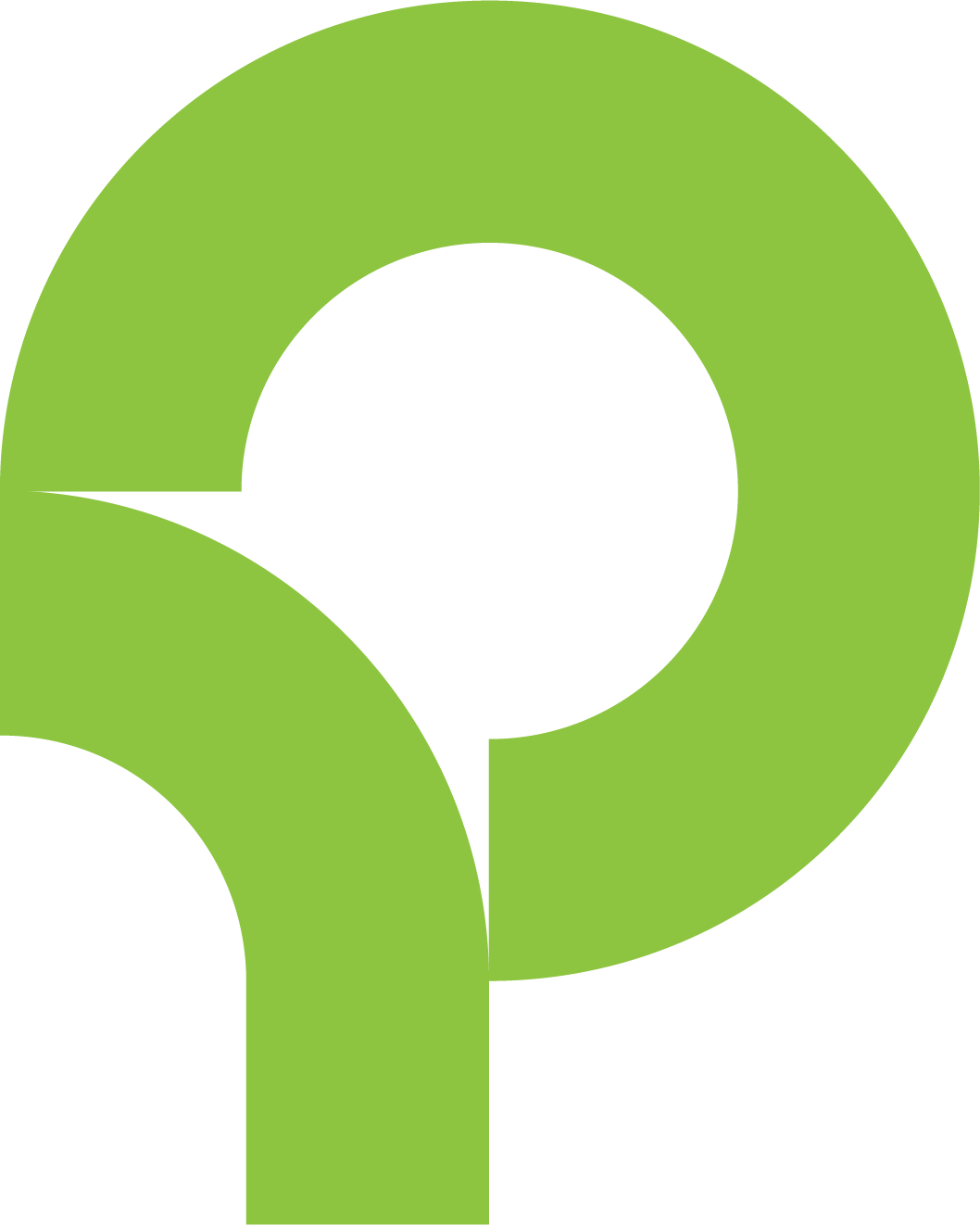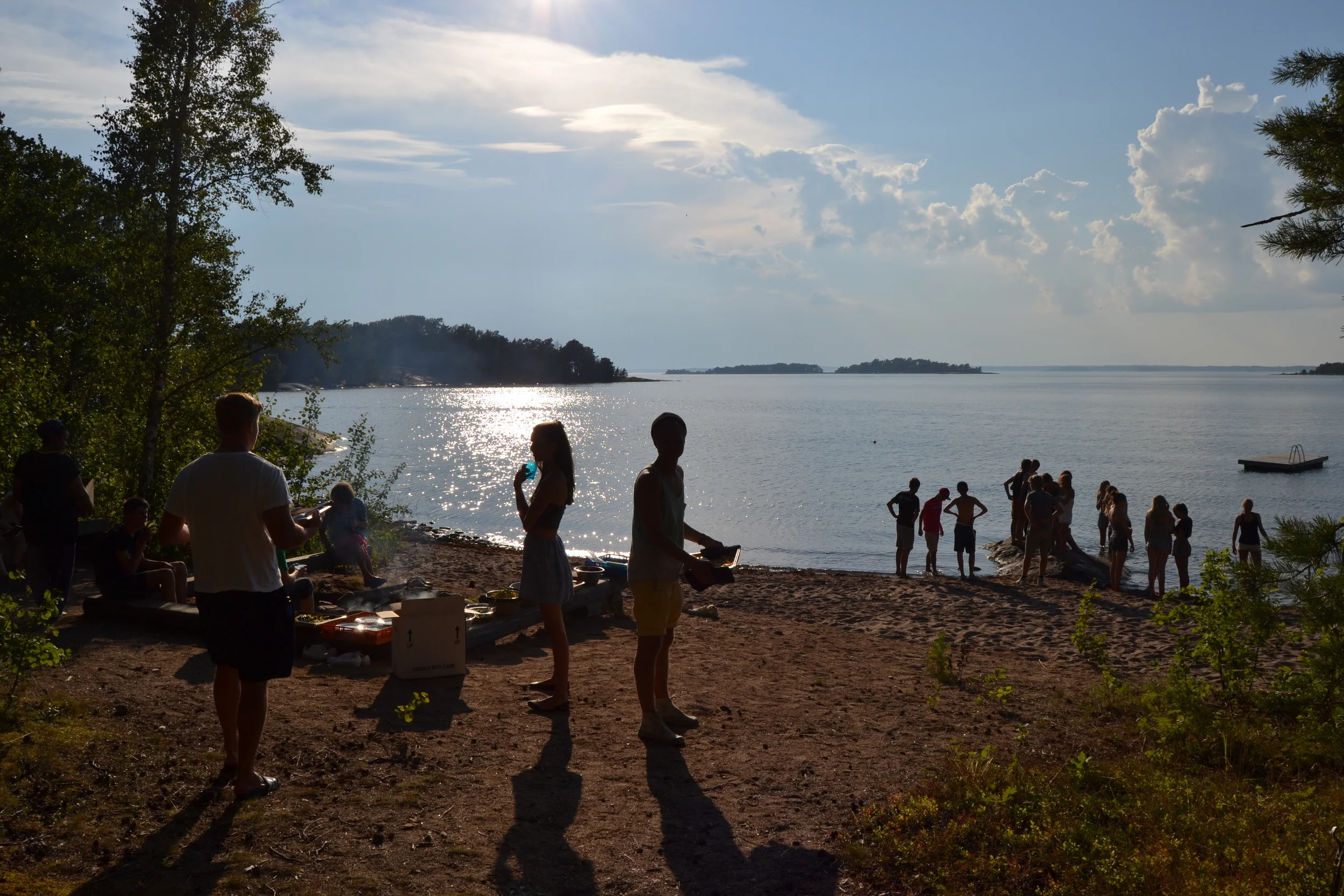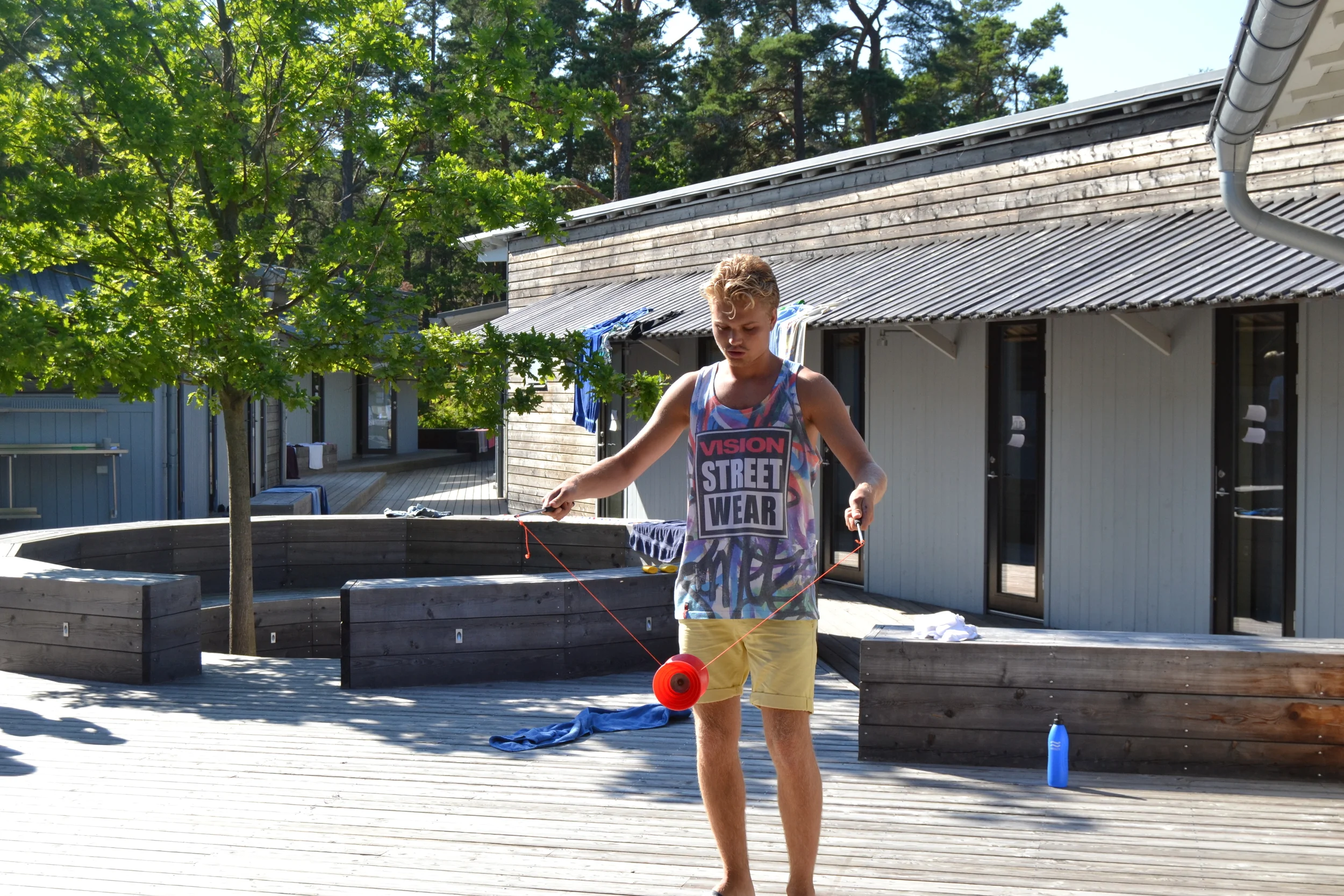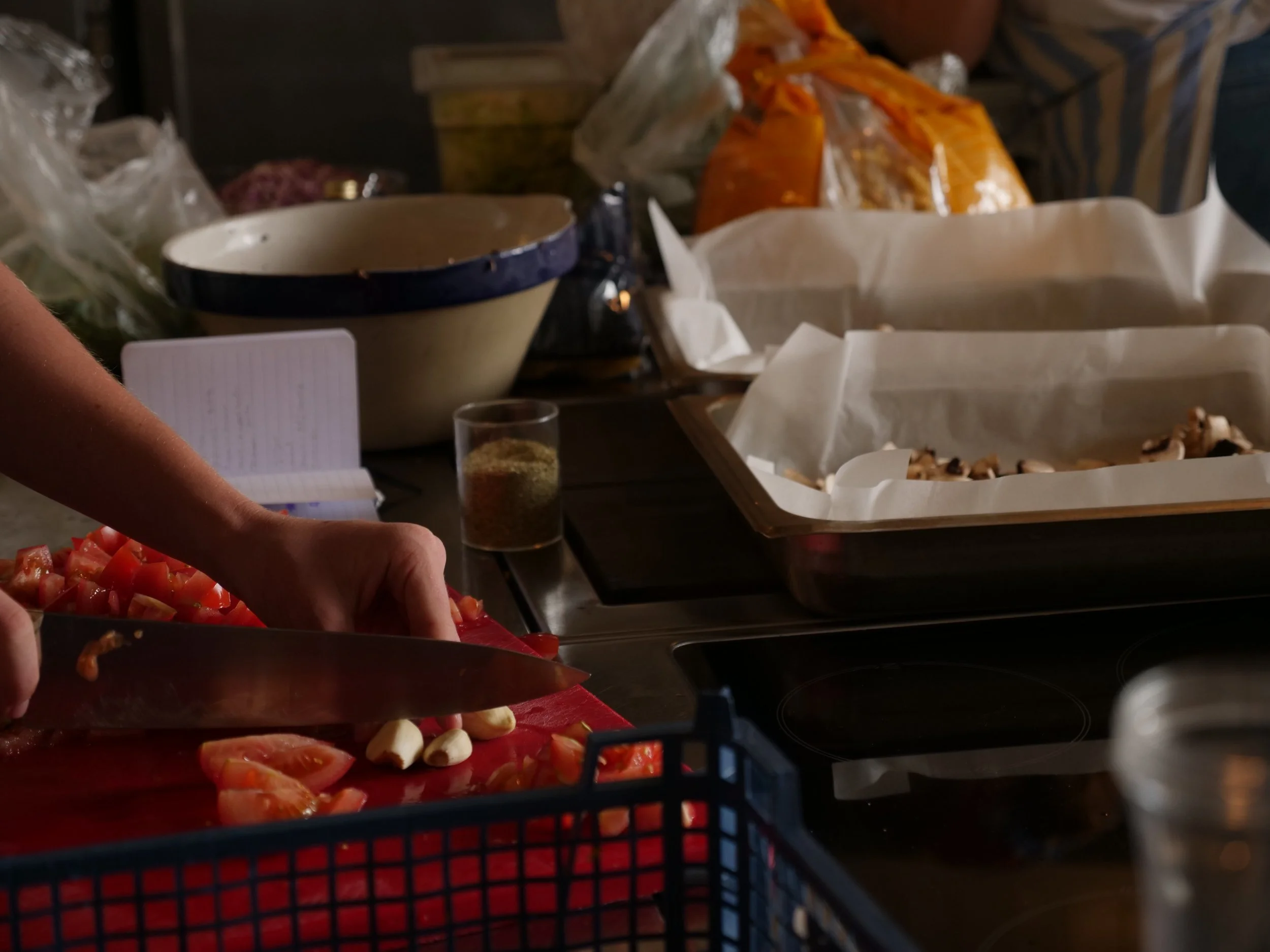
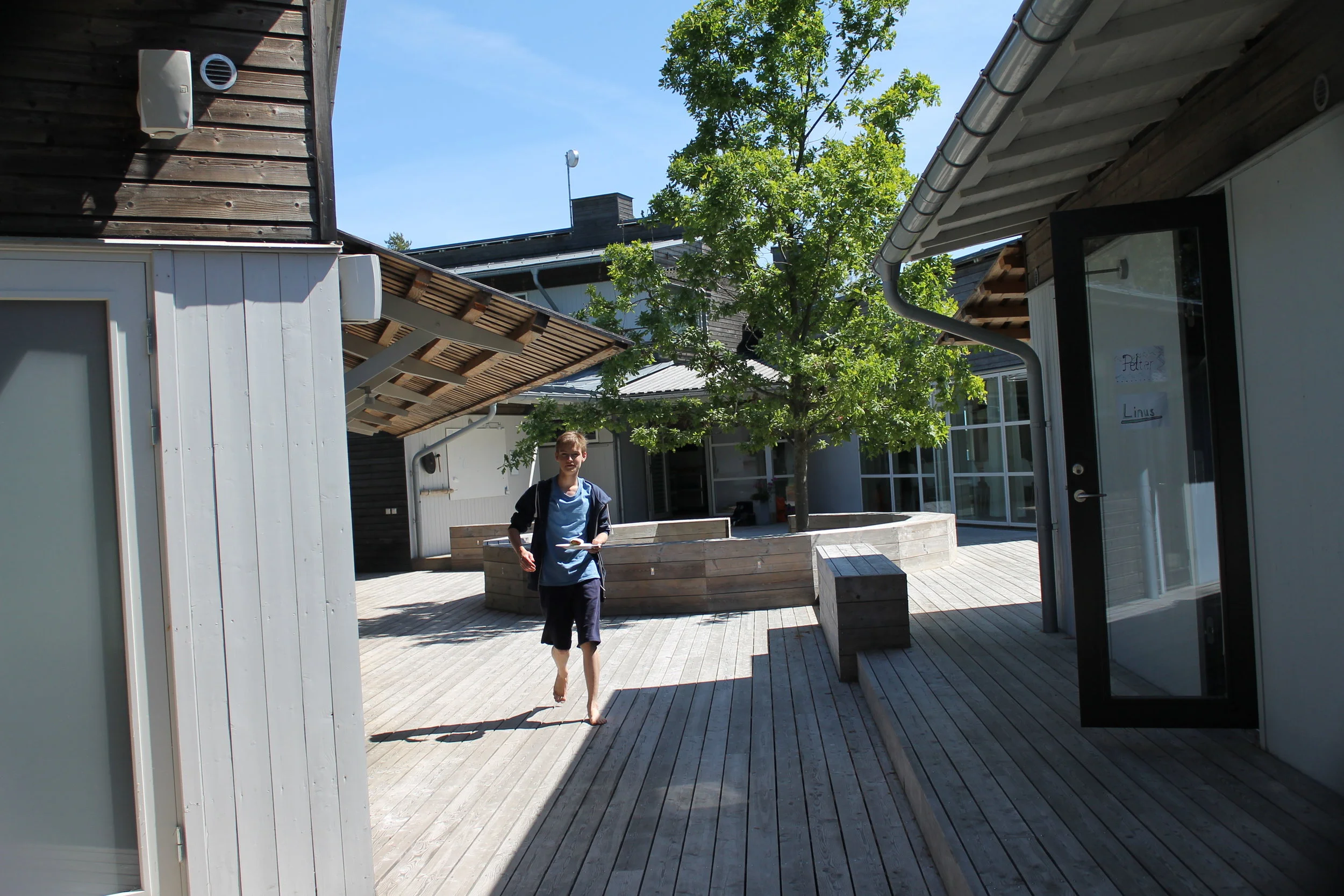


Intro
Protus
Intro
Protus
Welcome to Protus!
Protus is a religiously and politically independent non-profit organization. At Protus we explore life's big questions without ready-made answers and universal truths. Our camps are an exciting, warm and joyful experience where discussions, group exercises and games are interspersed with outdoor activities such as swimming, hiking and skiing depending on the season. Every year, we organize a number of camps where life, death, love and society are discussed in an open, accepting and non-political environment.
In the summer of 2026, we are planning our very first Protus camp entirely in English! The camp will take place for a week on the beautiful island Ekskäret in the Stockholm archipelago. The participants along with our coaches will have the island all to themselves during this time! .
Further down on this page you will find a comprehensive description of our methodology, principles and the general layout of the camp, but if you have any questions - please reach out to us at info@protus.se.
We’re so excited to see you this summer!

Our methodology
Our methodology
Our methodology
Our methodology
Philosophy
At the heart of the Protus philosophy is “curious exploration”, i.e. the participants' inherent passion to explore questions about themselves and the world. In order to achieve rewarding results from this drive, a number of aspects need to be considered. Two of these aspects are emotional safety and acceptance, which we believe are fundamental to creating a comfortable environment for personal growth and “curious exploration”. Another aspect is critical thinking, which should be seen here as a legitimate use of reason to explore a topic.
Protus is a philosophy-of-life association that is first and foremost for the campers and members, but we also serve society. By not taking a position on political, philosophical or religious issues, we are for all people. However, we have certain values and views that we uphold in our activities. Protus does not say what people should think, but that and how they should think, namely critically and with an open mind. Protus does not offer simple answers, but only tools that people can use to find their own answers.
Protus is an association that wants to help individuals grow as a person. This is much more than just a physical process that makes the body grow. It is also an intellectual, emotional and social process and it is these three aspects of human development that Protus cares about.
Protus' methodology for finding one's own place in the world and formulating one's own philosophy of life hopefully makes one grow intellectually, but our methodology aims for people to develop emotionally and socially as well, to the same extent if not more. Enjoyment, fun and friendship are always at the heart of what we do. Protus affirms the whole person, as a thinking as well as a feeling being.
There is a lot of talk and discussion at the camp, both organized and spontaneous, about important and unimportant things. Being able to talk and being properly listened to, have a voice and really understand what someone else is saying is one of the things that many of the participants appreciate most about the Protus camp.
PRINCIPLES
In order for the association to be effective, amicable and to fulfill its function, there are certain principles that must be maintained within it. As Protus is essentially non-partisan, it does not require its members to practice these principles outside the association, but they must be observed within the association and during its activities, as they are a prerequisite for Protus functioning.
Compassion:
Being compassionate means treating other people well, out of concern and not just as a means to an end.
Critical thinking:
Thinking critically is a prerequisite for fruitful discussions. It means questioning what others say, but in a constructive and respectful way, i.e. listening to what other people say and taking the time to evaluate how reasonable it seems.
Interpret in a positive way:
Always assume that your conversation partner has a positive intent and try to help them formulate their thought in the best possible way rather than intentionally misinterpret it and using it as a stepping stone for your own argument
Democracy:
Protus is a democratic association, which means that all members have the right to decide on the association together.
A Development path
The purpose of the camps is to offer a fantastic and fun experience in a natural environment together with other people and to offer the opportunity to reflect on life's big questions and get the chance to start formulating your own philosophy of life.
Each day of a Protus camp has a specific theme. The idea is that all the exercises on that day will give the participants the opportunity to reflect on that particular theme.
This experience can be reinforced by additional elements such as adapted food, appropriate choice of wake-up music, etc. The theme days are also arranged in a certain order and form a "common theme" that allows for linking discussions from one day to the next and providing deeper thoughts and insights.
In the first part of the camp, we explore how the world and we humans work. In the second part, we explore how each of us thinks the world and ourselves should be. This summer will be the first time that we hold a version of the camp in this format, so the precise layout of each day is still in the works, but a potential daily schedule for a six day camp could be:
Day 1: Arrival day. On the arrival day, the focus is on making everyone feel welcome and quickly establishing a good basic atmosphere in the participant group. All participants are included and a high level of tolerance is created. We set the framework for this particular camp and go through the set rules Protus has. The participants can also decide on certain rules and attitudes that will apply to their particular camp.
Day 2: Nature/Human.The morning is dedicated to nature. The exercises therefore revolve around experiencing nature around the campsite, testing various senses and talking about the physical world that surrounds us.
In the afternoon, we first do exercises that illustrate human beings as "animals"; how do our bodies work and how do emotions and needs arise? We then continue with our thoughts, our awareness or, if you like, our soul. “In what way are we animals?” “In what way are we different?”
Day 3: Life and development through it. Everything we know and think about the world and ourselves. This day is designed to build on the thoughts of the previous days to highlight how we change over time. Discussion topics on this day include: "What circumstances from my birth to now make me who I am?" and "What does my future reality look like and how do I think about it?".
Day 4: Love and relationships. However, life, as discussed on Day 3, is not only about me, but also about the people I live among: parents, relatives, teachers, friends and "adults". This day is about the relationships we have and how we deal with them. Especially about being in love and how to nurture such a relationship.
Day 5: Civilisation. The whole world is interconnected through relationships between people; together they form what can be called human civilization. In previous days, we have focused on nature, ourselves and everyone around us, but today we are broadening our perspective to include society. For example, we play games that illustrate how people form and govern their societies.
We also move further from the description of how the world is into how we individually think the world ought to be. “What is a good way to organize humanity?” “Is a well functioning dictatorship better than a chaotic democracy?”
Day 6: Morality and closure. Having spent the first part of the camp discussing how things are and what we actually do: nature, people, relationships, society, we now move on to consider whether any of this can be influenced. How I/we/society should be and how we should behave and live. What we call ethics and morality. Here the participants face moral dilemmas that are discussed and hopefully they get help in balancing their inner moral compass according to their own beliefs.
We also summarize the camp and reflect on how the things we have discussed here are applicable to our lives at home. What makes that life really worth living? How can I apply what I have developed here in my regular daily life?
We pack our things, clean up the island to leave it a little bit better than when we arrived and board the boat back to the city for tearfilled but happy goodbyes from our new friends
The pedagogical structure
In order for everyone - both participants and leaders - to have an amazing camp experience Protus has worked out a pedagogical structure to be followed on each camp. It is the responsibility of the team to make sure the structure is followed. With the help of this structure we hope all participants get to feel that the camp has given them something meaningful for life. The core of the pedagogical structure is that the camp has three layers, or levels, that are more or less accessible for the participants to discover and explore. The levels are as follows:
1. Sense of community, swimming, games, and nature
This is the surface level of the camp. Everyone can join in on this level. Here the participants are given memories for life and an experience above the ordinary when it comes to friendship, nature, and leisure activities. This has a multitude of functions, such as to strengthen the bond between participants and leaders, to give energy for activities and exercises and also to offer a change of scene and rewarding experiences to participants who might not be mature enough for the later levels. The games - which involves everything from tag to dancing - are both easy going recreation and relaxing meditation.
2. Exercises and discussions
For the majority of the participants the exercises, discussions and curious exploration give new insights on how to approach the larger questions of life. This is the main point of a Protus camp. This is the level that the participant can bring with them and have use of for a long time.
The exercises are scheduled activities which in different ways relate to the theme of the day. These activities are meant to give the participants the opportunity to examine questions and subjects which are relevant to the primary purpose of the camp - letting young people begin to formulate their own view of life.
3. Context
This is the deepest level of the camp. The days and exercises create a whole that perhaps not all participants, or even leaders, perceive. On this level the participant begins to build a coherent and reflected worldview, with their own understanding of answers to different philosophical questions. This level is made up by the themes of each day at camp and their given order. This order is made to be a consistent way towards a view of life. We start off with how the world looks - from the outside world to the world inside ourselves - we then move on towards questions about how the participants think the world and their own lives should be. Towards the end of camp all of this is put in relation with the individual and the participants are given the opportunity to look inward and try to understand their own place in the world. In conclusion, the camp is divided into three questions: how does the world work? How do I think it should work? And on this basis, how should I act in my life? This level does not need to be explained to the participants. It should be in the background and represented in the order of the themed days.
The myth of Prometheus - Protus “forefather” and inspiration
According to Greek mythology, Prometheus was a so-called Titan, one of the original gods. Together Prometheus and Zeus formed the first humans from clay and made them walk upright. Zeus gave the humans the spark of life, but at the same time he was frightened that they would evolve and start competing with him for power. He thought the humans should stay primitive, and use their wooden bows and knives made from bones to hunt their food.
Prometheus on the other hand had come to love the humans and he said to Zeus: “We have to give them our fire too. Otherwise they are as helpless as children. We have to finish what we started.”
When Zeus disagreed, Prometheus went to Olympus alone and in secret. There, the fires burned day and night. He lit a torch and gave it to the humans. With the help of this first fire, the humans made more fires and Prometheus taught them how to best use the fire. With the help of Prometheus, the humans evolved quickly and could better form their own destiny.
The fire is a symbol of reason and with reason the human world started its long journey that has taken us to modern society. But, as symbolized in the myth by the box of Pandora, with the gift of reason also came immense power, struggle and war; and many other unspecified evils which were then released into the world.
The Promethean question remains: How can we humans use our reason; our ability to reflect on ourselves and our actions; and our moral compass, to make good use of our unique gifts as humans?

FAQ
Frequently Asked Questions
FAQ
Frequently Asked Questions
Protus FAQ
WHO CAN PARTICIPATE?
Protus English camp is open to all young people in upper secondary school with sufficient English language skills. To apply for these camps, participants must not have attended a Protus camp before.
HOW MANY PARTICIPANTS AND coaches ARE ON THE CAMP?
Each camp has about 24 participants and 10-13 coaches where several coaches have special responsibilities such as camp manager, coaches manager, program manager, participant manager and facility manager.
WHO ARE THE coaches?
About half are young people who have participated in a Protus camp before. The other coaches are older and more experienced, with at least one member of the "parent generation" in each team. Coaches with main responsibility have normally been Protus coaches before and are usually over 20 years old. The remaining coaches are exercise coaches, who carry out the actual day programs with exercises and other activities, perform practical tasks, help in the kitchen and have the closest contact with the participants.
WHAT IS THE GENDER DISTRIBUTION ON THE CAMPS?
We want boys, girls, as well as non-binary, to be represented at each camp and in previous years the distribution between girls and boys has been fairly even and we have had some non-binary participants and leaders in recent summers. The camps work well even with a certain imbalance in the gender distribution, but in order for neither group to be completely dominant, we may mark a camp fully subscribed for either girls or boys.
HOW TO GET TO AND FROM THE CAMPSITE?
Travel to and from the camp island is by regular archipelago boats directly to Ekskäret. The cost of this is included in the camp fee. Drop-off and return places are the boats' docking sites at Strömkajen or Strandvägen. The exact time and place of departure and return is stated in the camp letter that goes out to all registered participants a month before the start of the camp. For the trip to the summer camp it is usually the morning of the day of departure, the return is also usually sometime in the late afternoon. A group of leaders will meet up at the departure point in Stockholm and accompany the participants out. The return journey is also accompanied by coaches.
WHAT IS THE STRUCTURE OF THE CAMP AND WHICH THEME DAYS ARE THERE?
The camp is organized according to an elaborate structure that is formulated in our manuals (coach, camp and exercise manual). In this structure, each day has a theme that follows a common thread through the camp and there are suggestions for exercises, activities and games for each day. An example schedule can be found here.
However, the schedule is customized for each camp as it is designed by each leadership team according to the skills and interests of each group of coaches and participants.
We don't have the manuals open for everyone to read as there is a pedagogical benefit for the participants not to know in advance everything that will happen during the camp. If you want access to any manual as a parent or future coach you can contact info@protus.se.
CAN PARENTS VISIT THE CAMP?
Since the pandemic, we have removed the possibility to visit the camps.
WHAT LEVEL OF ENGLISH DO I NEED?
This is the first Protus camp to be held in English. Even though it will take place in Sweden the camp, all the discussion, all the instructions and all the small talk and games will be in English. Most of the instructors will be native English speakers and all at a very high level. In order to enjoy and be able to participate the participants must have English as one of their main languages and their instruction language in school. In order to build a group and to avoid exclusion, English will also be the language used between participants in their spare time. We will talk to each participant before the camp to welcome them and gauge their expectations of the week. At the same time we will assess their language level and might potentially recommend another camp if we do not think they would be able to participate. For fluent Swedish speakers we strongly recommend one of our five Swedish camps we are arranging in the summer
CAN A PARTICIPANT BE SENT HOME BEFORE THE END OF THE CAMP?
Many things can happen during a camp. The coaches' first priority is to create a healthy group of participants. Therefore, for the good of the group, they always have the right to send a participant home if the situation requires it. Of course, their goal is that no participant has to leave the camp, but sometimes it is a necessity. Examples of reasons for a participant going home before the end of the camp can be great homesickness, rule violations, some kind of illness/crisis situation, or that participants by not participating in exercises or opposing the work of the coaches make the camp experience worse for others. No money will be refunded in case of a participant being sent home.
IS IT POSSIBLE TO REGISTER FOR FUTURE CAMPS?
No, but we have an interest list that you can sign up for. You will be notified when the registration for that camp is released.
WHEN AND HOW WILL I RECEIVE CONFIRMATION OF PARTICIPATION?
Once your application has been received, we will confirm within a few weeks that we have registered your application and whether we have been able to reserve a place.
WILL ALL PARTICIPANTS BE ACCOMMODATED?
The camp has approximately 24 places, allocated on a first-come, first-served basis, with a reserve list for any cancellations.
WHAT ARE THE LIVING ACCOMODATIONS?
At our island Ekskäret you live two people in each room. The Protus camp participants and leaders are the only people on the island during the camp.
At night there is always at least one coach on call, which means that the person takes nightly rounds around the facility and is available to the participants throughout the night. Everyone helps with practical matters such as cleaning, some cooking, etc.
CAN I GO AND STAY TOGETHER WITH A FRIEND?
Of course you are welcome as friends. At the same time, one of the fun things about camps is the chance to make new friends. The decision on whether to stay with a friend is made by the leadership team, taking into account factors such as room availability or specific reasons.
HOW IS THE FOOD?
We aim to ensure that the food is tasty, varied, healthy and sufficient for everyone. Historically we have been pleased to receive very high participant ratings for the work of our chefs. Requirements for special diets and the extent to which the participant can take care of these themselves are to be filled in on the application so that we can assess whether we can satisfy them. We have a special rule that pure sugar eating such as sweets, soft drinks and sweet desserts and snacks should not occur at the camps. There is also no access to shops or kiosks during the camp.
WHAT RULES OF CONDUCT APPLY?
Some practical rules of conduct, such as division of tasks, sleeping hours, use of cell phones, etc. will be determined on the first day. However, indisputable rules of conduct include the prohibition of alcohol/drugs and not leaving the island during the stay, except in case of organized activities or emergencies.
WHAT DOES IT COST?
The indicative cost for the 2026 Protus English camp is around EUR 600
CAN I GET FINANCIAL SUPPORT FOR THE FEE?
We want everyone to have the opportunity to attend a Protus camp, regardless of their financial circumstances. It is therefore possible to apply for a grant for part or all the camp participation fee, which is given to less well-off families. If you want to apply for a grant for the participation fee, you start by registering for the camp and then contact info@protus.se with the heading "apply for a grant for the participation fee", and we will help you with it.
AM I COVERED BY INSURANCE DURING THE CAMP?
Protus Camp participants are covered by a basic accident insurance policy, similar to that Swedish schools provide for their students. General health and emergency insurance is provided by the Swedish government for EU citizens Participants not possessing a European Union health card would need to arrange their own health and travel insurance
Do you request a police record extract from your coaches?
Yes, Protus requests an extract from the criminal record of prospective coaches every year in connection with the leadership training. More on the Swedish police website here.
ARE THERE TICKS ON THE ISLAND?
Ticks are present in many parts of the Stockholm archipelago and it is important to protect yourself against them. If you have the opportunity to be vaccinated against TBE before going to camp, it is recommended. It is also important to check for ticks during the camp and remove them if necessary. There are tick pickers at the camps.
